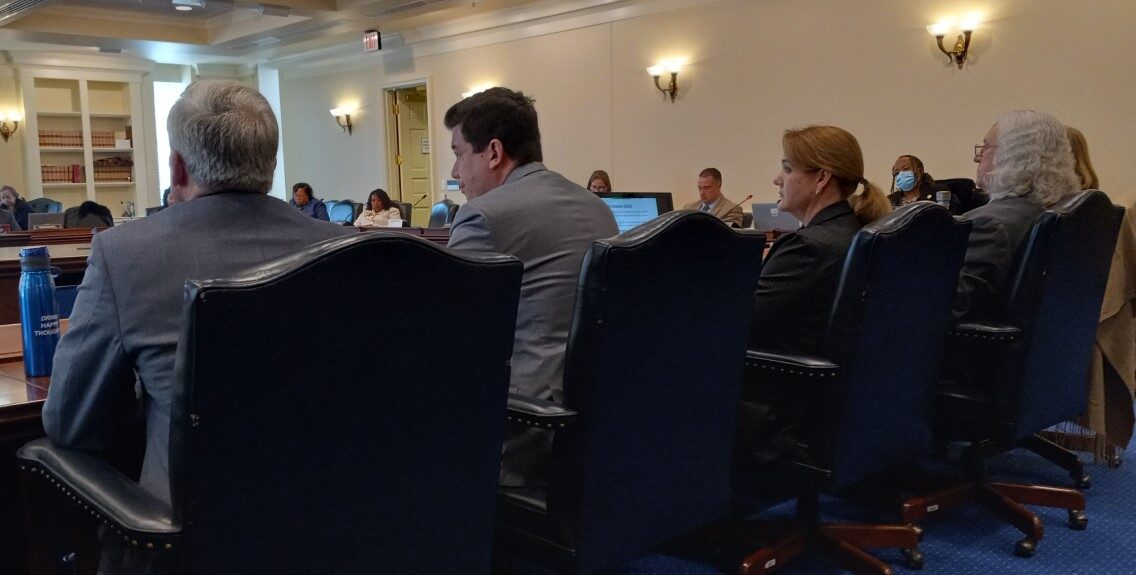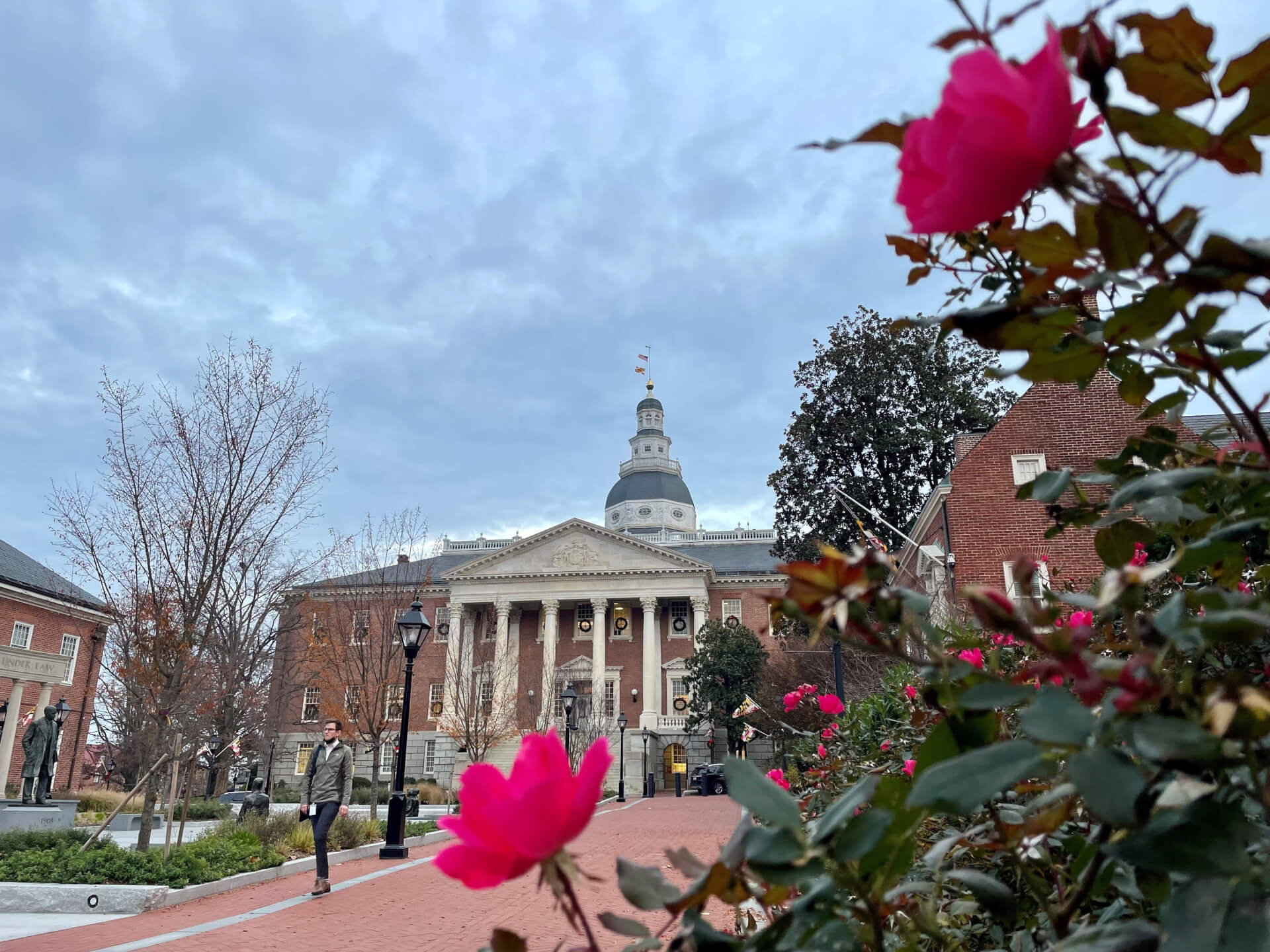Gov. Moore is about to shake up the Public Service Commission. Here’s why it matters

With a single, swift personnel move this week, Gov. Wes Moore (D) may have done more to advance Maryland’s battle against climate change than volumes of legislation or months of advocacy ever could.
That’s the optimistic view of many environmentalists after Moore announced Wednesday that he was rescinding 48 recess appointments to state boards and commissions that his predecessor, former Gov. Larry Hogan (R), made last year. Included on the list were two of Hogan’s appointees to the Maryland Public Service Commission — meaning Moore is now in the position to pick three of the panel’s five commissioners over the next several weeks.
“The environmental community is ecstatic,” said Josh Tulkin, director of the Maryland Sierra Club. “This is the single biggest thing you can do to set up climate progress in this state for the next four years.”
The Public Service Commission is an obscure and often sleepy regulatory entity, steeped in the arcana of energy policy, utility law, gas and electricity generation and transmission, and consumer protection mandates. But it regulates an enormous part of the economy, as Marylanders spend billions of dollars a year to turn on the lights and heat their homes, businesses, commercial buildings and public institutions.
As state policymakers advance more aggressive goals for confronting climate change, the PSC is also partially responsible for interpreting and implementing several of the new laws — and many environmentalists believe the commission has fallen short of meeting the imperatives of the climate crisis.
“The bottom line,” Tulkin said, “is that the Public Service Commission can be a proactive force for good, driving equitable climate policy forward, or it can be a massive impediment, and what it’s been so far is a massive impediment, dragging its feet.”
Roger Berliner, a former Montgomery County councilmember and long-time energy policy lawyer, said environmental advocates and policy experts across the country are increasingly looking at state energy and utility regulators as critical decision-makers.
“Who do you look to on climate?” he said. “There are 50 people you should focus on. For those of us who care about the planet, this is the single biggest thing we need to focus on.”
Del. David Fraser-Hidalgo (D-Montgomery), a leading environmentalist in the General Assembly, said the prospect of three vacancies on the PSC creates a reset in the relationship between the legislature and the commission. New leadership on the PSC could enable the state and utilities to maximize the amount of federal dollars they seek to combat climate change, and could expedite utilities’ transition from fossil fuels to cleaner energy sources.
“I think it creates an opportunity to engage the PSC on climate change-related issues in important and more aggressive ways,” Fraser-Hidalgo said.
The PSC is led by five commissioners, who are appointed by the governor and confirmed by the state Senate and serve staggered five-year terms. The person the governor selects to be chair largely sets the agenda.
Officially, the commissioners oversee 19 gas and electric companies, taxi and livery drivers, bay pilots, privately-owned water and sewer companies, and telecommunications companies that supply telephone land lines. The commission hears rate cases; considers industry developments and applications to modify the scope of service; promulgates new rules and regulations; and assesses the quality of utility service.
It’s a complicated portfolio under any circumstance, and has become more complex over the years as Maryland policymakers envision an ever-swifter transition away from fossil fuels and toward cleaner energy sources.
“We are in the forefront, rivaling [the Maryland Department of the Environment] and [the Maryland Energy Administration], of being in the front seat when it comes to addressing climate change, energy and environmental issues,” PSC Chair Jason Stanek told the House Economic Matters Committee at a hearing in Annapolis this week.
The PSC accomplishes its work with 156 full-time employees; by contrast, the government entities regulating utilities in Pennsylvania and Virginia have more than 500 and 700 full-time employees, respectively. Stanek calls the PSC “a small but mighty agency.”
All five commissioners are steeped in energy policy and have worked in the industry, or for federal and state regulatory or policy agencies, for most of their careers. Collectively, Stanek said, they have 125 years’ of experience in the industry — and the PSC has only been around for 113 years. Because Hogan served as governor for eight years, all five of the current commissioners are his appointees.
So who are the members whose terms Moore short-circuited?
The first is Odogwu Obi Linton, who was first picked in 2017 and who Hogan tabbed for a second five-year term last summer. Linton is a former regulatory attorney for Baltimore Gas & Electric whose career in the utility industry dates back to the 1990’s, when he was a meter reader for an electric company in New Jersey.
Moore also rescinded the appointment of Patrice Bubar, appointed last year to complete the term of a prior commissioner who was scheduled to serve on the PSC through June 30, 2024. Bubar previously had been the deputy director of the Montgomery County Department of Environmental Protection, and has also worked for the Nuclear Regulatory Commission, the Department of Energy and the Environmental Protection Agency.
By rescinding their appointments, which he did without explanation, Moore can pick someone to serve the remainder of Bubar’s term and someone for the remainder of Linton’s term, which runs through 2027. The two commissioners were vulnerable because their nominations had not been confirmed by the state Senate.
It is entirely possible, though by no means certain, that Moore will advance two nominees for the PSC by Feb. 17, the day the governor is due to forward his “Green Bag” appointments for myriad state jobs, boards and commissions to the Senate.
But at the same time, Stanek’s first five-year term as chair is due to end on June 30, and it’s conceivable that Moore would look to replace him as well — though the timetable for doing so is not altogether clear. Before taking over the PSC, Stanek was the senior counsel for the U.S. House Energy and Commerce Committee on Capitol Hill, worked for the Federal Energy Regulatory Commission and the Commodity Futures Trading Commission, and worked for a fuel company in Buffalo, N.Y.
Tori Leonard, a spokesperson for the PSC, said Thursday that the three commissioners will continue to serve until their replacements are confirmed by the Senate and sworn into office. The two holdover commissioners are Michael Richard, a former deputy chief of staff to Hogan who once headed the Maryland Energy Administration and worked for the Department of Energy, and Anthony O’Donnell, a former Republican leader in the House of Delegates who was a safety worker at the Calvert Cliffs nuclear plant in Lusby, where he lives. Richard’s term ends in 2025 and O’Donnell’s term concludes a year later. Both men have served on the commission since 2016.
Already rumors are running rampant in Annapolis about who might be appointed to the PSC to replace Bubar, Linton and Stanek. The names range from industry attorneys and current and former regulators to consumer watchdogs, environmental activists and current and former elected officials — including senior lawmakers in the General Assembly. Any nominee from the latter category could produce a set of falling dominoes in the legislature — and it’s possible that additional lawmakers will be picked for other positions in the fledgling Moore administration in the weeks ahead.
Advancing the climate objectives
Coincidentally, the news of the likely shakeup at the PSC comes the same week that Stanek and his colleagues are appearing before legislative committees for informational hearings. On Tuesday, in the House Economic Matters Committee, which helps set utility policy and is the committee that may be monitored more closely by industry lobbyists than any other, Stanek said he would like to see the commission do more to encourage battery storage and modernization of the electric grid, along with more energy distribution planning.
Stanek also expressed skepticism over legislative proposals to expand competition in the energy markets. While utilities are the default providers of electricity and gas for most ratepayers, consumers are permitted to shop for other energy distributors. Some large national energy companies, including NRG, would like to further deregulate the utility market in Maryland and promote more competition, but some consumer advocates have warned that ratepayers could be susceptible to shady deals that sound good at first but require higher payments at the back end.
“I now think it’s more of a detriment to the state than a benefit,” Stanek said of greater deregulation.
But most environmentalists argue the PSC hasn’t done enough to end utilities’ reliance on fossil fuels, which they believe has slowed the state’s transition to renewable energy and could impede the state’s goals of reaching 100% carbon-neutral electricity by 2035. Moore has vowed to make climate change a top priority for his new administration.
“For too long, the public interest in Maryland and the interests of utilities have been one,” Berliner said. “We need to make sure the utilities are doing everything to advance the state’s climate objectives.”




 Creative Commons Attribution
Creative Commons Attribution